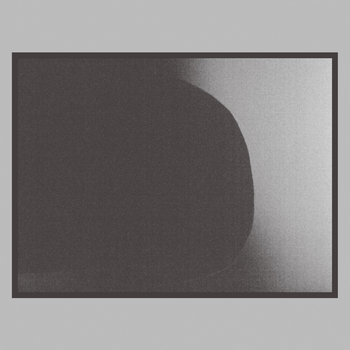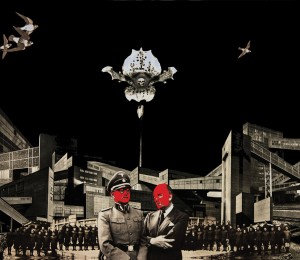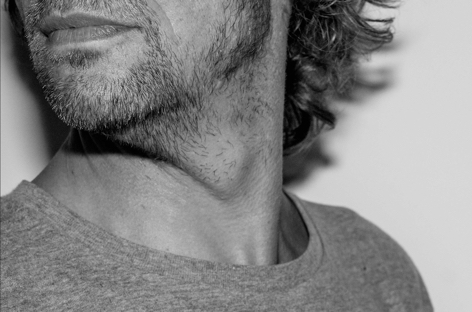News & Events

A Pink Sunset For No One is the eighth studio album from Noveller, the solo electric guitar project from US composer and filmmaker.
One of the most adept guitarists of our time, Lipstate returns with her signature breathtaking cinematic, experimental soundscapes. Eloquent and striking, her instrumentals evoke colorful and otherworldly imagery. Lipstate writes in majestic, emotional strokes with pieces ranging from remarkably tense environments to shimmering psychedelic rock or unraveling into something darker.
More information can be found here.

A few years ago, my dear friend and bandmate Jamie Stewart and I were talking about SWANS. I started to mention how much I admired the utterly personal approach to guitar that Norman Westberg had developed on those early records and moreover how that had blossomed out so richly on this latest incarnation of the band. During the course of the conversation Jamie mentioned a CDR that Norman had passed to him, which collected a few pieces of solo work that Norman had been working on. I was instantly curious to hear these pieces and started to track down the recordings online. After some investigating I found Norman’s CDRs available through an Etsy shop he had set up. I ordered one and a couple of weeks later, after I’d listened to that first CDR non-stop for a few days, I order all the others I could get my hands on.
The first solo work I heard from Norman was this recording, Jasper Sits Out. I was instantly struck by the textural sensitivity he managed to create with nothing more than a guitar and some modest pedals. He managed to find a depth in what was a very limited palette and that impressed me greatly. The connections to his work with SWANS was clear, in that his trademark relation to tonality was present. Instead of relying on volume to achieve this sonic state though, Norman’s solo practice relied on a sense of swaying harmony and orbiting loops to create a tonally dense sound world that was very much personal, but overtly invitational to the listener.
Jasper Sits Out, the title referencing the Westberg family mascot who has now sadly departed, reflects Norman’s interest in minimal structures and the processes of iteration that are formed through the manipulation of looping fragments. Creating almost tidal surges across these pieces, Jasper Sits Out speaks to his abilities to contour sound in time. The lead track for example is truly oceanic in that is has a remarkable tidal flow of strumming textures that seem to sink below one another in a effortless wash of textural density.
I could not be more pleased to be able to share this music through Room40. This edition comes completely remastered and features a bonus piece recorded exclusively for this edition. I encourage you to listen deeply.
- Lawrence English January 2017

Japanese legend Keiji Haino meets two of Belgium's most active and valued musicians: Jozef Dumoulin- keyboards (Lilly Joel) and Teun Verbruggen - drums (Othin Spake).
The Miracles Of Only One Thing is a deep and intense testimony of this meeting. Keiji Haino - without any doubt one of the most important musicians from the Japanese underground scene, is at his best.
Teun Verbruggen (drums & electronics) and Jozef Dumoulin (keyboards & electronics) did a 3-week tour in Japan in Sept 2015 playing concerts in duo, but also solo and with local musicians. One of those musicians was hero Keiji Haino, whose work has included rock, free improvisation, noise, percussion, psychedelic music, minimalism and drones. Besides his legendary bands Fushitsusha and Lost Aaraaff, he has worked with artists and bands like Boris, The Melvins, Jim O'Rourke, Oren Ambarchi, Peter Brötzmann and Steve Noble.
As for Dumoulin and Verbruggen, they are both known for their always refreshing and groundbreaking work that breaks up the barriers between free improvisation, electro, jazz and more. Jozef Dumoulin is part of the duo Lilly Joel appearing recently on Sub Rosa (SR416).
The three teamed up for a studio recording and a recorded live-show. Out of all the material, they distilled an album that reflects both the excitement of the new bond as well as the deep and vast sonic landscapes that their joined forces laid bare.
More information can be found here.

Timely outing from two grand masters of exploratory electronics. Kassel Jaeger is the moniker of French musician François Bonnet who works at the GRM and has released a number of books including the highly regarded The Order of Sounds, A Sonorous Archipelago published by Urbanomic in 2016. Jim O’Rourke is known to most through his explorations of the song and shapes, the high and low, the east and south.
Wakes on Cerulean is a joint adventure where process folds upon process and the operation of procedure remains unknown. Amongst a mysterious cloud of excited high frequencies tiny whistling howls. Frog leaps in technique lay out a thrilling and uplifting journey that runs from the soothing to ecstatic and back to the buoyant again.
Wakes on Cerulean is a staggering feast of the joys found in electronic process. A malleable bubble of hovering excitement, melody and joyous refrain.
More information can be found here.

Available for the first time since being issued privately as extremely limited vinyl, Dirter are pleased to announce the CD issue of the ultra rare 2014 two-track LP The Great Ecstasy of the Basic Corrupt. The additional track "Circles of Confusion" comes from the equally rare Silver Bromide LP.
Indulge yourself in these three immersive, ocean deep and intensely powerful tracks of sinister whimsy for the wretched. Yet another classic from the timeless and ever evolving Nurse With Wound.
More information can be found here.

World-renowned as one of experimental music's most vital and impressionistic composers of the past few decades, William Basinski’s tape loop works have been especially influential, particularly on the historic series, The Disintegration Loops, where distorted, orchestral tape samples burrow deep into the listener's psyche through meditative repetition. On his new album, A Shadow In Time, Basinski plunges deeper than ever for the plaintive, solitary eulogy to David Bowie, aptly titled "For David Robert Jones." Conversely, the title track, "A Shadow In Time," is a subtle, celestial escalation of melody and drone. The result is one of the most truly transcendent pieces of music he has ever committed to – or wrung from – tape.
More information can be found here.

Cruel Optimism is a record that considers power (present and absent). It meditates on how power consumes, augments and ultimately shapes two subsequent human conditions: obsession and fragility. This pyramid is an affective ecology of the (ever)present moment.
When I made Wilderness Of Mirrors, clouds of unease were overhead. As I have worked through Cruel Optimism, what seemed an unimaginable future just a few years prior, began to present as actual. Over the course of creating the record, we collectively bore witness to a new wave of humanitarian and refugee crisis (captured so succinctly in the photograph of Alan Kurdi’s tiny body motionless on the shore), the black lives matter movement, the widespread use of sonic weapons on civilians, increased drone strikes in Waziristan, Syria and elsewhere, and record low numbers of voting around Brexit and the US election cycle, suggesting a wider sense of disillusionment and powerlessness. Acutely for me and other Australians, we've faced dire intolerance concerning race and continued inequalities related to gender and sexuality. The storm has broken and feels utterly visceral.
Cruel Optimism is a meditation on these challenges and an encouragement to press forward towards more profound futures.
Beyond the motivations forging the record, the process by which this edition was created was unlike many of my other records. Having worked largely alone in recent years, I wanted to shift away from that approach. I wanted the opportunity for exchange, to trial new ideas in various spaces and to find myself surprised by the perspectives of others. It was this desire that led me to reach out to friends, old and new, and invite them to contribute to Cruel Optimism. It also led to me using a range of studio spaces to explore new techniques, informed by what I had learned taking Wilderness Of Mirrors on the road for the better part of two years.
I leave it to you then, to listen as you can. This record is one of protest against the immediate threat of abhorrent possible futures. It’s an object of projection, from me to you and onward from there. I couldn’t be more pleased to share Cruel Optimism with you.
More information can be found here.

Last Signs is Eli's first solo release since 2012's Catching Net (PAN Records) and explores a very different side of his
unique acoustic universe. One in which the macrocosmic percussive collisions of his earlier work give way to a gradual
unfolding of dub-influenced rhythmic constellations. Eli has described Last Signs as his response to playing in club
environments over the last few years; an attempt to negotiate a delicate balance between the materiality of his acoustic
instrument and the hyper-mediated sonic ecosystem of the club sound system. Coming off like an inspired synthesis
between Scientist and Xenakis, Last Signs of Speed is a truly unique work by an artist at the height of his
powers.
More information can be found here.

"Demdike Stare return with their first album since 2012’s Elemental, a feral, loose-limbed and angular rave odyssey wrecking Dancehall and Jungle templates via found sounds, Ambient and exotic spaces.
Wonderland plays the full breadth of the duo’s wide open aesthetic, taking their Testpressing series of dancefloor lashes - issued on 12” between 2013-2015 - as the diving board for an innovative, reverie-like album forming a parallel dancefloor narrative where the spirits of mid ‘90s jungle and digital dancehall are made plasmic, malleable, and syncretised with industrial and ambient techno sound design.
Rooted in record collecting and the art of DJing, and in line with Demdike’s atypical style and pattern, Wonderland veers across styles and temporalities, forming wormholes between Hardstyle and submerged jungle in the curtain-raiser, "Curzon," and going in like Slimzee slicing up grime dubs with jungle in the crackden atmosphere of "Animal Style," whereas the eleven-minute "Hardnoise" catches them at full stretch, tumbling from head-rinsing noise to a dank, sublow techno mission framed by unsettling ambience somewhere between Prurient’s Rainforest Spiritual Enslavement episodes and a mutant variant of classic Exotica, before coughing you up someplace else.
At the album’s epicentre, "FullEdge (eMpty-40 Mix)" obliterates distinctions between dancehall and techno as you’ve never heard, an edit that re-laces their formerly mutually exclusive ligature in a belly-tightening and brilliantly messed-up new mutation, before "Sourcer" prangs out like a cyborg calibrating itself to ragga jungle arrhythmia, and the psychoacoustic nose drip of "Fridge Challenge" dissipates into the ‘static thizz of "Overstaying" at the LP’s perimeter, like some DJ Sprinkles cut paused at mid-flow and delayed, re-shaped into a tense burner.
It’s probably the most enjoyable and loose-limbed hour of music in their catalogue, or that you’ll likely hear in these weird, angst-ridden times."
-via Boomkat

Rashad Becker's new full length album, Traditional Music of Notional Species Vol. II is a newly developed continuation and exploration of work since his highly-acclaimed first volume.
Incorporating more instrumental-sounding components, the record moves through both fluid and dissonant sounds which take on different structural and sculptural challenges through carefully-layered compositions. Following Traditional Music of Notional Species Vol. I, the new album expands in various elements, distorted and warped, focusing in on the tension and energy of synthesized sounds that appear to exist hauntingly physical.
Known for his unrivaled attention to sonic detail across his work, Becker’s unique techniques and expressive manipulations of sound are laid bare in an exhilarating new form, stylistically distinctive and uncompromising.
The album is mastered and cut by Rashad Becker at D&M, featuring artwork by Bill Kouligas.
More information can be found here.

